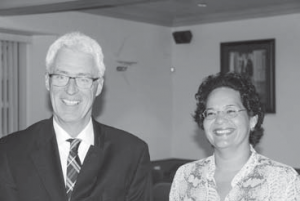The contours of new legislation to streamline the administration of tax law in the Caribbean part of the Kingdom were presented Wednesday by President of the Joint Court of Justice Evert Jan van der Poel and quartermaster and project leader Jane Jansen.
Since October 2014, Jansen has been responsible for the preparation of the implementation of new legislation to introduce the possibility for appeal and cassation at the High Court in The Hague in tax cases. One of these preparations concerns the establishment of tax administration with the Courts of Aruba, Curaçao and St. Maarten, as well as for Bonaire, St. Eustatius and Saba. Up until now, Aruba is the only country in the Dutch Caribbean to have implemented legislation to make appeals in tax cases possible.
Aruba adopted the law on January 1. In case there is a legal dispute with the tax office, one can now submit this case, similar as in civil cases, to the Court of First Instance. Under the new law, the Joint Court of Justice serves as Court of Appeals for all fiscal matters, including fines. A judge who will be solely hearing tax cases will be installed in August.
Under current legislation, the Council of Appeal for Tax Cases (Raad van Beroep voor Belastingzaken) is the only legal entity to settle tax disputes in Curaçao, St. Maarten and the Caribbean Netherlands. As of June 30, the Court of First Instance in Bonaire will serve as Court of Appeals in tax cases for Bonaire, Statia and Saba, with the Joint Court of Justice obtaining appellate authority.
St. Maarten and Curaçao are still working on implementation of the new laws. The Council of Advice of St. Maarten presented a report in December 2014. The Department of Legal Affairs is now preparing a new proposal to be submitted to the Ministers of Finance and Justice. After approval by the Council of Ministers, the changes to the law will be presented to Parliament.
Pressure
Van der Poel said he was hopeful of a speedy introduction of the new laws. He said some pressure needed to be put on Parliament and the Minister of Justice to achieve this. “These laws are not only of importance to residents and businesses, but also to investors who not only want to know if they are entitled to a tax holiday, but also want to know if their investments are protected by law. This is essential if you want to attract big players. It is very important for them to know that they will have forums for appeal, including the High Court of the Netherlands,” said Van der Poel to his audience of lawyers, tax office workers and civil servants. Under the new laws, the Courts on the various islands will be serving as front offices for their respective islands. These will serve as contact, information and reception points for their “own” cases.
The St. Maarten Court will also serve as front office for tax cases from Statia and Saba. A back office for tax administration for all the islands has already been established in Aruba. St. Maarten tax cases will be heard in St. Maarten, but tax cases concerning Statia and Saba will be heard on the respective islands.
The new legislation is intended to streamline the process and to make the administration of justice in tax cases more efficient. Under the current system it takes from approximately 18 months to two years before a case is heard. This also has to do with the fact that tax cases are currently heard by a three judge panel from the Netherlands, who are flying to the Caribbean two times a year to hear a large number of cases. The new way of working is to make it possible to hear cases within one year and to present a decision within six weeks after the hearing. It is the intention to hold tax hearings in St. Maarten every two months.
Currently, some 125 tax cases from St. Maarten are pending with the Council of Appeal, approximately half of which are ready to be heard and handled, it was stated. The second chance for appeal in tax cases was introduced in the Netherlands on January 1, 2005. The absence of appeal was considered in violation of the European Human Rights Treaty and the International Treaty on Civil and Political Rights. A draft law to also introduce appeals in the Dutch Caribbean, was presented to the Parliament of the Netherlands Antilles in July 2010. At the end of the meeting, Van der Poel said he was hopeful to be able to evaluate the first phase of the changes by next year.

 Archive of posts from Saba-News.com Archive Saba News
Archive of posts from Saba-News.com Archive Saba News